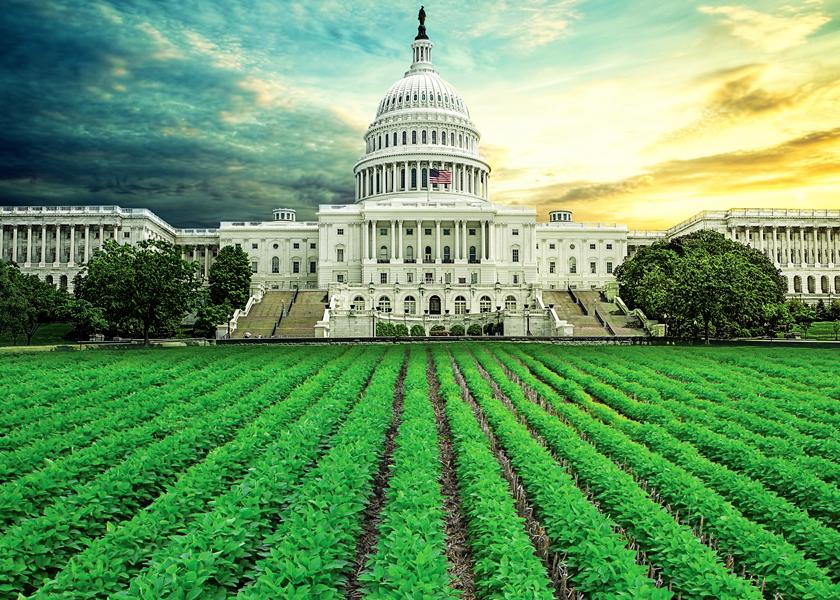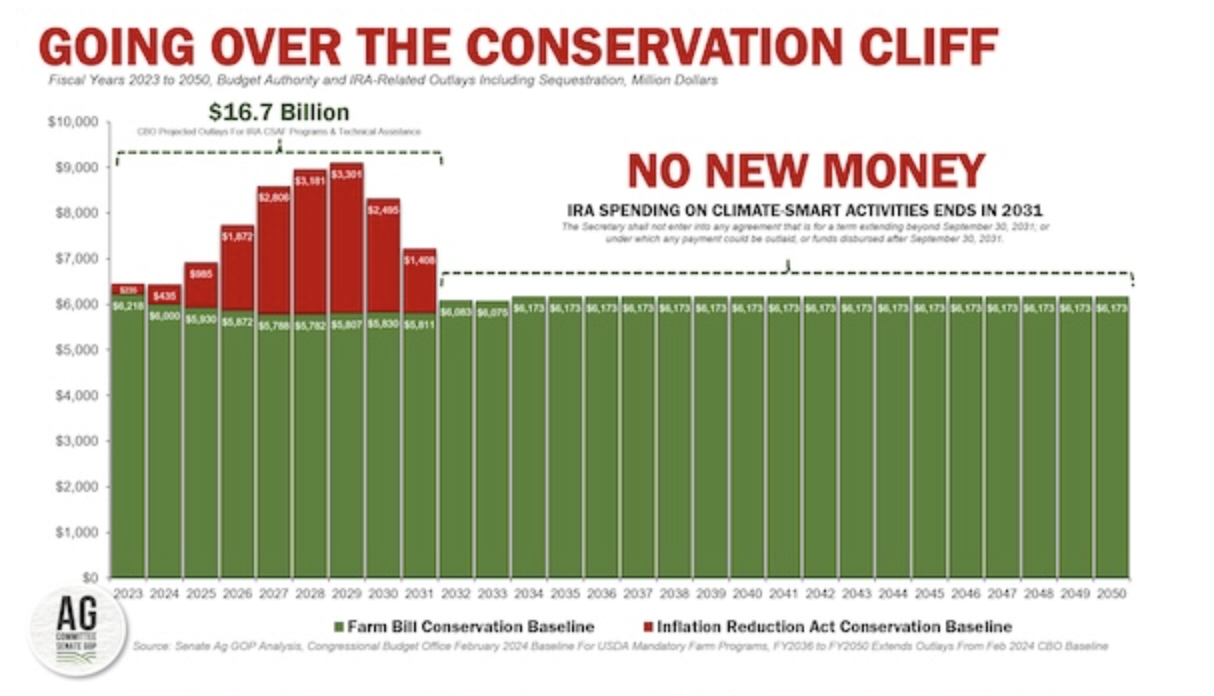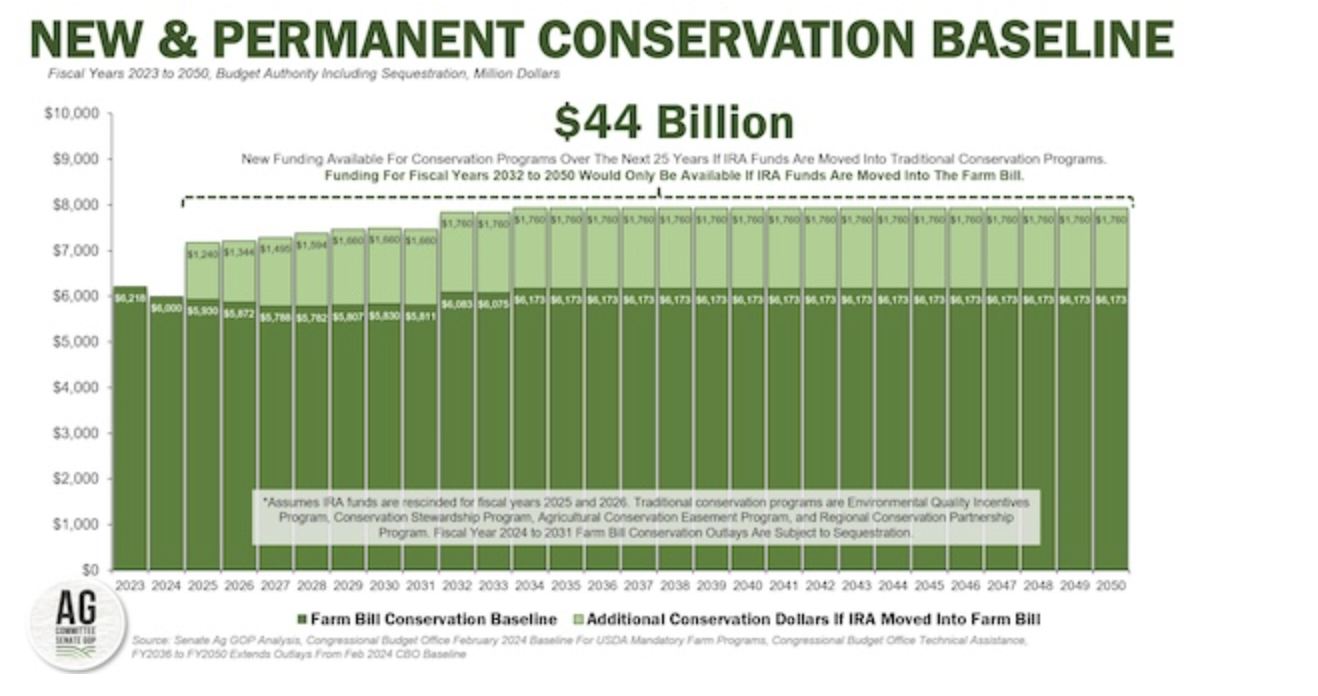The Conservation Cliff and Redirecting Climate Funds, Two of the Latest Controversies in Passing a New Farm Bill

Odds of a new farm bill in 2024 are declining, with Senate leadership continuing to spar over climate funding and Senate Ag Committee Chairwoman rejecting the GOP's proposal to redirect climate funds into the commodity title of the new farm bill.
The Republican staff of the Senate Agriculture Committee published a report on conservation in the farm bill earlier this week. Senate Ag Committee Chairwoman Debbie Stabenow (D-Mich.) has said she is unwilling to reprogram conservation money in the Inflation Reduction Act (IRA/Climate Bill), but the GOP report says, “Any discussion about ‘protecting IRA resources’ that does not begin with prioritizing additional baseline for the conservation title risks missing out on this investment.”
The report discusses a potential bipartisan solution to address a looming "conservation cliff" resulting from the IRA of 2022. This act allocated significant funds for climate-smart agriculture and forestry activities (CSAF), but these funds are set to expire by 2031, creating uncertainty for conservation efforts. The proposal suggests moving the IRA funds into the farm bill to create permanent funding streams for conservation activities.

Key takeaways from the GOP staff report include:
- Opportunity for increased funding: Congress has an opportunity to increase funding for conservation, natural resource preservation, and wildlife habitat needs by moving IRA funds into a bipartisan farm bill.
- Potential impact: By reallocating IRA funds, there could be a substantial increase in conservation spending over the next 25 years, totaling more than $44 billion, which is three times larger than the expiring IRA resources.
- Bipartisan solution: Moving IRA funds into the farm bill could represent a historic bipartisan investment, benefiting farmers, ranchers, foresters, conservationists, and other stakeholders.
- Mechanism for funding: By utilizing Section 257 of the Balanced Budget and Emergency Deficit Control Act of 1985, the new increased funding levels for conservation programs would continue into perpetuity, subject only to Congressional reauthorizations.
- Potential agreement: The report suggests rescinding funding for IRA agriculture conservation programs in fiscal years 2025 and 2026, redirecting these funds to provide nearly $1.8 billion per year for local communities, farmers, and ranchers for conservation efforts.
- Need for action: The report emphasizes the urgent need for Congress to act to address the conservation cliff, highlighting the demand for conservation program spending that exceeds available funds.
- Stakeholder involvement: The proposal involves various stakeholders, including farmers, ranchers, foresters, and conservationists, who rely on voluntary conservation programs to meet their local conservation needs.
- Environmental benefits: Redirecting IRA funds into the farm bill could help improve soil health, water quality and quantity, reduce greenhouse gas emissions, and sequester carbon, contributing to the economic and environmental sustainability of farming for generations to come.

Stabenow Rejects GOP's Proposal to Redirect Climate Funds
The Senate Ag GOP report was a "pre-buttal" to event to the climate-smart agriculture expo on Capitol Hill Thursday. Stabenow and USDA Undersecretary for Farm Production and Conservation Robert Bonnie spoke at the event. During Stabenow's remarks, she rejected GOP's proposal to redirect climate funds into the commodity title of the new farm bill.
Stabenow emphasized the importance of retaining climate funds for their intended purpose during an expo on climate-smart agriculture practices. She criticized the idea of splitting the funds, with half going towards commodities, as unacceptable.
Republican staff members from the Senate Agriculture Committee suggested moving $13 billion in climate funds, provided by the 2022 climate law (Inflation Reduction Act/IRA), into the conservation title of the farm bill to bolster conservation spending in the long term. Stabenow expressed support for increasing the conservation baseline but insisted that it must align with the statute's language on climate-smart agriculture.
In negotiations over the farm bill, farm groups and GOP farm-state lawmakers have prioritized higher reference prices and a stronger crop insurance program, both of which require funding. Climate funds have been considered as a potential source to offset these costs. However, Democrats, including Stabenow, have been firm in their stance against cuts to climate funds or the Supplemental Nutrition Assistance Program (SNAP).
Meanwhile, Stabenow highlighted ongoing negotiations on various aspects of the farm bill, expressing optimism about reaching agreements, particularly regarding strengthening the climate funds title. She emphasized the need to ensure that climate funds are used appropriately.







